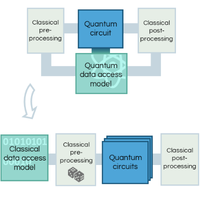Abstract
We propose a class of randomized quantum algorithms for the task of sampling from matrix functions, without the use of quantum block encodings or any other coherent oracle access to the matrix elements. As such, our use of qubits is purely algorithmic and no additional qubits are required for quantum data structures. Our algorithms start from a classical data structure in which the matrix of interest is specified in the Pauli basis. For Hermitian matrices, the space cost is qubits and, depending on the structure of the matrices, the gate complexity can be comparable to state-of-the-art methods that use quantum data structures of up to size , when considering equivalent end-to-end problems. Within our framework, we present a quantum linear system solver that allows one to sample properties of the solution vector, as well as algorithms for sampling properties of ground states and Gibbs states of Hamiltonians. As a concrete application, we combine these subroutines to present a scheme for calculating Green’s functions of quantum many-body systems.
- Received 17 May 2023
- Revised 15 December 2023
- Accepted 4 March 2024
DOI:https://doi.org/10.1103/PRXQuantum.5.020324
Published by the American Physical Society under the terms of the Creative Commons Attribution 4.0 International license. Further distribution of this work must maintain attribution to the author(s) and the published article's title, journal citation, and DOI.
Published by the American Physical Society
Physics Subject Headings (PhySH)
Popular Summary
With the advent of quantum computers, many different quantum algorithms have been proposed that could provide an advantage over their classical counterparts. In one regime, near-term algorithms such as variational quantum algorithms have been proposed, of which small instances can already be run on the quantum computers we have today. These approaches can be very hardware efficient, but they tend to lack generic runtime guarantees. At the other end of the spectrum, there has been a longstanding study of so-called “fault-tolerant” algorithms, which do have runtime guarantees, but they often have large hardware requirements. This motivates the study of early fault-tolerant approaches that maintain the runtime guarantees of fault-tolerant schemes but reduce hardware requirements, in order to bridge the gap and potentially accelerate the advent of quantum algorithms with speedup over classical approaches.
In this work, we reduce the hardware requirements of fault-tolerant algorithms by reducing their qubit usage. This is specifically achieved by using a randomization approach and by removing the requirement for quantum “oracles,” which are black boxes that other algorithms need to call in order to access classically encoded data. These quantum oracles can require a lot of qubits to implement, and so removing them saves qubits. We give a recipe to construct algorithms with these features that can sample properties of functions of matrices, given two conditions. First, we require a Fourier series approximation of the function. Second, we require a decomposition of the matrix in the Pauli matrix basis. We present concrete examples for the quantum linear systems problem and for sampling properties of ground states and Gibbs states of Hamiltonians.
As the size and quality of quantum computers improve, we envisage the need to find quantum computing applications that accommodate restricted hardware requirements, in order to reach for quantum advantage in the earliest possible time frame. We consider this work an early step toward this goal.



